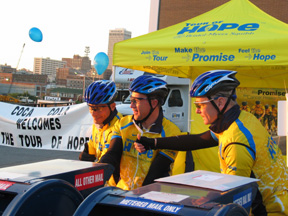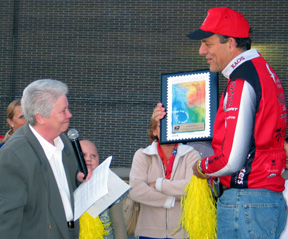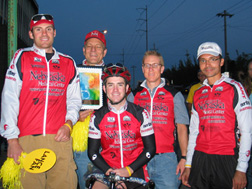 |
Tour of Hope cyclists prepare to embark on the next leg of their cross-country journey. |
In all, 20 cyclists – cancer survivors, physicians, nurses, caregivers, researchers and loved ones – are relaying 3,500 miles, round-the-clock as part of the Bristol-Myers Squibb Tour of Hope, an eight-day journey across America to invigorate the public about the importance of cancer research.
The team left Los Angeles Oct. 1, and are being joined by cancer survivor and six-time Tour de France champion Lance Armstrong at points along the way before being welcomed in Washington, D.C. on Saturday.
 |
Omaha Postmaster EvaJon Sperling presents a commemorative stamp to UNMC’s Byers “Bud” Shaw Jr., M.D. |
Cancer binds each cyclist wearing the yellow and blue Tour of Hope jersey. As they ride, America learns more about the high school biology teacher who lost her 18-month-old son to cancer, the company vice president who survived brain cancer, the Wichita, Kan., firefighter whose wife died of cancer, the Illinois architect who survived leukemia and the Iowa woman who survived skin cancer.
At each stop, the cyclists meet others who have been touched by cancer. In Omaha, they were inspired by Omaha attorney Jim Cavanagh, who was treated for lymphoma at UNMC five years ago, and cancer survivor Byers “Bud” Shaw Jr., M.D., professor and chairman of UNMC’s Department of Surgery.
“The value of clinical trials is huge,” Cavanagh said during the rally. “It amazes me what’s being done in the field. I would participate in clinical trials anytime, if the medical providers thought there was any potential of learning about this disease and how to manage it better or cure it.”
|
|
Cavanagh, a partner in the Omaha law firm of Lieben, Whitted, Houghton, Slowiaczek and Cavanagh, said clinical trials produced treatments that were not available to him 18 months earlier. “It was a very, very dark time,” he said, of when he learned the diagnosis. “I wondered ‘how the hell can I beat this?’ Then it dawned on me, there is hope out there. Clinical trials give us hope and knowledge.”
Dr. Shaw expressed his “anger and hatred for cancer,” noting how one in three people will get cancer in their lifetime and how the money spent on cancer research is only a fraction of what is spent on terrorism preparedness.
“Research is the foundation for all medicine, but it’s especially important for cancer patients,” said Dr. Shaw, an avid cyclist who was diagnosed with non-Hodgkin’s lymphoma on July 25, 2002. “For cancer patients, research means hope and the possibility of more effective treatment modalities. This is a great opportunity to make people more aware of cancer research and the difference it can make in people’s lives.”
During the Tuesday’s rally at main branch of the U.S. Postal Service in Omaha, Postmaster EvaJon Sperling presented Dr. Shaw and Cavanagh with a framed, commemorative breast cancer stamp, which has raised about $40 million for cancer research.
 |
Members of Team Kaos, the cycling team sponsored by UNMC, University Medical Associates and The Nebraska Medical Center, gave their support to the Tour of Hope cyclists. From left to right, Jason Kingsbury, Byers “Bud” Shaw Jr., M.D., Jimmy Kingman, Mark Brackenbury and Marco Vasquez. |
Over 60 percent of children with cancer are enrolled in cancer clinical trials, compared to just 5 percent of adults with cancer. Clinical trials have helped increase the cure rate in childhood cancer from 10 to 75 percent in the past three decades.
Without clinical trials, no medicines would be available to treat cancer. Every approach to cancer screening and detection and every cancer treatment available today has come from clinical trials.
For more information on the Tour of Hope, visit tourofhope.org.